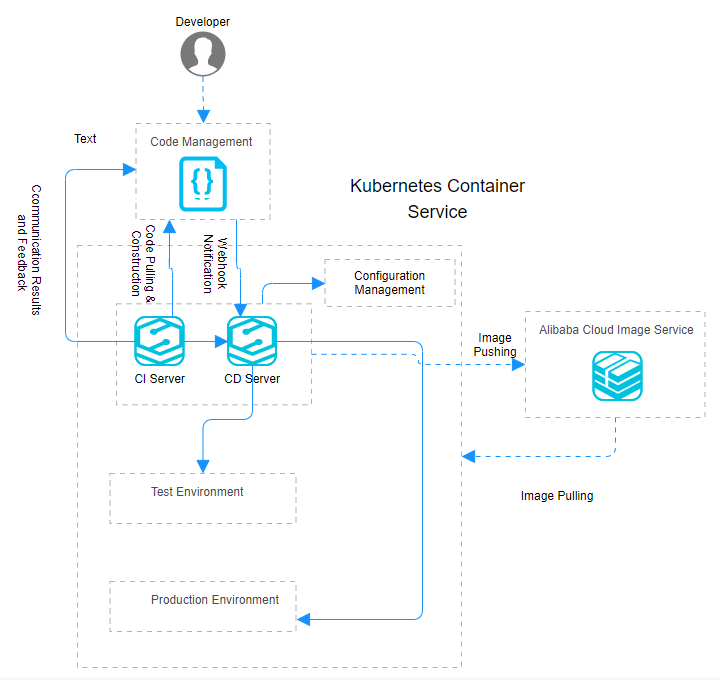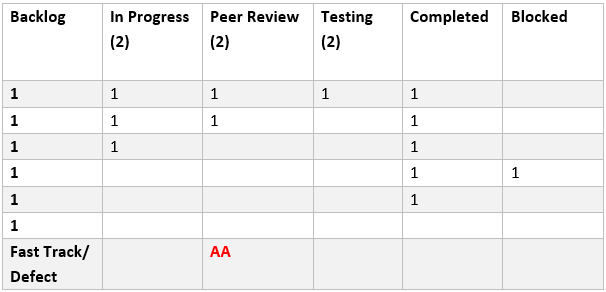DevOps is a culture, development or practice that accentuates the joint effort and correspondence of both developers (Dev) and other Operations professionals (Ops), along with Quality Assurance (QA) representatives, while automating the procedure of software development and framework changes. DevOps targets setting up a culture and condition where building, testing, and releasing software can happen quickly, much of the time, and more dependably.
Different people have varied point of views for the definition of DevOps. For some, it is a standard or a method. To many, it is an integrated culture in the IT world. As our consistently changing work environment is developing in a very fast manner, the demand for faster delivery and fixes in the software development market is on the rise. Thus, the need for the production of high-quality output in a short span of time with limited post-production errors gave birth to DevOps. The aforesaid term was coined by Patrick Debois in 2009 to make way for quick and effective delivery of software updates, bug fixes, and features.
In simple words, the DevOps application during the software development process reduces the number of steps necessary to bring software to market. These faster releases and streamlined processes mean swift user feedback. Alibaba Cloud is among the top market leader today, who offer state of the art DevOps Solutions.
Alibaba Cloud has been offering certification courses and training on various DevOps solutions and practices. Check them out.
DevOps isn't tied in with picking the best ones from certain developers and some IT Operations individuals and silo-ing them off. The first thought was basically to dispose of the incorporated information and operations from unique sources kept up by discrete dev and operations divisions.
Further this was to survive or resolve process bottlenecks in the product development and establishing a smooth, unsurprising flow-stream, for the most part on the operations side. Today, with the advancement of DevOps, the objective is supporting a consistent conveyance pipeline. Operations has been adopting such a large number of the procedures utilized by developers to help progressively agile and responsive procedures that we're seeing a sort of "dev-ification of operations", as said by the creator and analyst Gene Kim.
This article explores some less common DevOps implementation practices and why they could be beneficial to use.
DevOps has transformed from a service to culture. Alibaba Cloud and their strategy behind enabling organizations and businesses to adopt and expand, has showcased a well-planned approach. The whole idea is to enable developers to deliver high-quality applications and make the whole process seamless, including building, delivering, and future builds with Continuous Integration and Delivery.
DevOps flows with incremental implementation. This enables an organization to process changes and make adjustments with a pre-defined schedule, when a new and improved system comes along, or when updates become necessary. Alibaba Cloud provides a robust Infrastructure as Code (IAC) platform for developers, so they don't need to worry about anything related to the backend. Alibaba Cloud has worked out a way to introduce a robust infrastructure that provides automatic provisioning options with Server Load Balancer and Elastic Compute Service.
To ensure the best implementation of DevOps with your organization, you need to focus on a few things. Let's take a look at the DevOps flow that needs to be kept in mind for basic operation scenarios while you read this article.
Side-Note: I am going to talk about some practices that are not necessarily common. As a developer or IT decision-maker, you already know that Testing Automation, Continuous Integration, and Continuous Testing are some of the parameters to follow. Well, let's go off the beaten path and talk about some less common implementation practices. The Alibaba Cloud DevOps solution includes most of these metrics for a smoother altogether operational overview with DevOps.
Maintaining a deployment cycle frequency is as important as feeding your pet on-time. Without maintaining a schedule (a very important metric), things can be erratic and uncontrollable. It is very much recommended that you keep track of build frequency and integration frequency. QA or planning phases should also be kept in check. Maintaining quality by keeping defect metrics in check is also an important practice to maintain software quality.
Implementation of DevOps within any organization requires a clear front of what should be used, automated, and how frequently an application should go through Integration. Your team size for specific application modules and what is going through the update also matters, but the tasks to be performed as a consecutive integration takes place must be kept to a certain size. This will enable better and more documented performance during implementation.
Defect escape rate is amongst the most important metric to keep in check while going through the SDLC. You need to know and check on how many defects there are in production and QA.
Let's take a look at a chart that showcases the defect escape rate over a certain time. This report was generated looking at the India Hello World application implementation with DevOps using Alibaba Cloud.
In this blog, we'll talk about the best practices of DevOps testing using Alibaba Cloud.
Building a Successful DevOps Testing Strategy
Testing methodologies have been an integral part of development in the software industry, however, DevOps testing scenarios are much different from traditional software testing practices. DevOps testing has to be strategized first before you decide to go ahead with it. A successful testing strategy aims to churn out builds at a faster pace. The total process of building, testing, and releasing software has to be the most important bit behind a successful DevOps testing strategy.
This is the very first step to defining a pipeline that is suitable for your software delivery. From new application software to software already in place with traditional delivery models, defining a DevOps testing strategy will enable a faster channel for development, delivery, and updates. This will further enhance business productivity. If you are upgrading your delivery pipeline from a traditional approach, this will also take care of any bottlenecks you may have faced previously.
Attaining successful deployment and maintaining it for all the releases or sub-releases of your software is an essential practice. Alibaba Cloud DevOps solutions integrate its testing environment within the CI/CD practices. Let's see how it works using the diagram below:

Kanban boards can help you look at your deployment stages in a more graphical format. It visualizes the data stream into usable workflow diagrams and lays out the complete delivery process in a visual format. Alibaba Cloud supports Kanban. You can easily incorporate it for a better understanding of what is happening with your current strategy and make an informed decision about any required changes to overcome a performance bottleneck or any other issue with the process. Below, there is a similar representation of a near-identical Kanban layout.

Kanban increases the overall workflow since it highlights each step with a visual representation. You can easily make out any bottlenecks or other issues that may be affecting the performance of your total delivery process. Different teams working within the cycle can collaborate using Kanban to help achieve a better DevOps workflow.
Just a quick reminder – Alibaba Cloud Academy offers excellent courses for you to master DevOps and follow a better learning path. Be sure to check it out if you're interested!
DevOps is all about collaboration and teamwork. The best results come after the best utilization of resources. Define and assemble your teams with priorities and ways to be in sync in mind. Let's discuss some of the most important and best practices to follow while testing.
In part two of this two-part article, we will further discuss and provide more tools associated with DevOps for better automation and delivery models.
Alibaba Cloud and its products have proven to be one of the most elastic in terms of usage. Cloud infrastructure mainly depends on how precise, optimized, and properly placed your products and services are. Products like the Elastic Compute Service (ECS) and Alibaba Cloud Container Service for Kubernetes (ACK) have brought enormous elasticity of operations and easier development/deployment for developers.
Similarly, the DevOps solutions offered by Alibaba Cloud have optimal reliability associated with accelerated development and delivery of applications on the cloud. Implementing DevOps has taken away the two roles of development and operations and made these two a single entity. This has helped complete organizational goals while staying in sync.
As we discussed in part one of this article, Alibaba Cloud has worked toward providing exactly what organizations seek, an urgency to develop a unified software development and delivery model. In part two of this article, we will discuss more automation tools associated with DevOps that will further provide better automation and delivery models.
DevOps is mainly preferred because it offers some of the most important mechanisms for better and more enhanced application development, delivery, and the aftermath. It provides very convenient automation for building, testing, and reporting. These processes ensure a more reliable, error-free, and efficient integration and development.
Efficiency in resource management is another plus when it comes to saving resources while repeatedly solving the same problems. Alibaba Cloud DevOps provides a standardized approach to deployment and the production environment. With that, end-to-end monitoring provides a robust and error-free system, ensuring business agility. Now, let's discuss some other DevOps tools.
With the help of Container Microservices, a user can run an application across multiple computing environments. It could be a production environment or moving from a physical machine to a virtual machine on the cloud. The only requirement is ensuring the same kernel type.
Alibaba Cloud Container Service helps overcome conflicts between teams working on different software within an infrastructure. It creates microservices that are small parts that constitute a bigger application. It enables the reuse of code for the developer and also enables a container to dislodge an application from its surroundings so the developer teams can continue working on such containerized application fragments. These containers work on a single OS and share a kernel with containers.
This optimizes the user experience of setting up a simple application and makes it easier for entry-level users to use cloud computing products.
As the largest cloud provider in China and the 3rd largest cloud provider worldwide by revenue , Alibaba Cloud ECS has the scale to provide high elasticity that can meet your business needs instantly. We can provide hundreds of thousands of vCPUs in minutes for a single customer in a single region, that is because of our sophisticated smart placement algorithm, dynamic and automatic planing as well as our optimization of both hardware and software.
Optimal continuous delivery process
Working with Jenkins, Container Service automatically finishes the complete process of DevOps from code submitting to application deployment, makes sure that only codes passed the automated test can be delivered and deployed, and efficiently replaces the traditional method of complicated deployment and slow iteration in the industry.
Implement agile development and deployment to accelerate business iteration of enterprises
In the production environment of enterprises, microservices are divided reasonably and each microservice application is stored in the Alibaba Cloud image repository. You only have to iterate each microservice application, and Alibaba Cloud provides the capabilities of scheduling, orchestration, deployment, and gated launch.
In this part we will finally deploy our application in the cloud!
We will create 3 environments:
The two first sections are quite theoretical as they deal with cloud infrastructure design and development workflow.
The next two sections introduces Terraform and Packer: as you can see in the previous parts of this tutorial, creating our environment for GitLab and SonarQube with the web console is quite slow. Since we will have to create 3 nearly identical environments, we will use Terraform and Packer to speed-up the process.
In the five last sections we will use Terraform, Packer and GitLab to create an highly-available architecture that will be automatically built and updated with a new pipeline stage.
What is DevOps? Its a combination of cultural philosophies, practices, and tools that increases a team’s ability to rapidly deliver services. In this clouder course, you’ll learn the concept and history of DevOps, how it works compared with traditional methodology, tools that support DevOps and recap the ideas with some classic case studies.
In this clouder course, you’ll learn how to conduct DevOps practices on Alibaba Cloud by using Alibaba Cloud services like ECS, some open source tools and GitHub.

2,593 posts | 793 followers
FollowAlibaba Clouder - April 20, 2017
Alibaba Clouder - September 2, 2020
Alibaba Clouder - January 11, 2021
Alex - June 21, 2019
Alibaba Clouder - September 2, 2020
Alibaba Clouder - September 7, 2020

2,593 posts | 793 followers
Follow Server Load Balancer
Server Load Balancer
Respond to sudden traffic spikes and minimize response time with Server Load Balancer
Learn More Auto Scaling
Auto Scaling
Auto Scaling automatically adjusts computing resources based on your business cycle
Learn MoreMore Posts by Alibaba Clouder